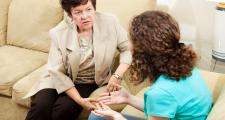Ask, don't wait to be told about child sexual abuse

Social workers should ask children about sexual abuse in the family environment rather than waiting to be told.
That was one of the key messages from the CSA (Child Sexual Abuse) Centre during a webinar hosted by regulator, Social Work England.
Anna Glinski, deputy director of knowledge and practice development at the CSA Centre, said children who were victims of sexual abuse were being let down by the system but social workers could do more to help them.
This, she said, could be achieved in part by identifying what needs to be done in social work education to ensure social workers are equipped with the necessary skills.
“What we need to do is just learn what that is, and be brave enough to do it,” Glinski said.
“We have spent the last seven years trying to persuade those with the power to change social work education. Unless we change social work education about child sexual abuse we will continue to not be able to support victims and survivors in the way that we should.”
Reflecting on her time working in local authorities prior to joining the CSA Centre, Glinski said: “It was during this period I saw the way children and young people and adults and their families are silenced, not just by their experiences of sexual abuse but by the system that should be supporting them.
“While sexual abuse can feel complex and emotional and actually a little bit scary there are just so many things that we can all do, particularly as social workers, to make a really significant difference to children, young people and adults and families that we work with.”
The webinar was entitled ‘Responding to the Challenges: Practice Where There Are Concerns of Child Sexual Abuse in the Family Environment’.
Glinski highlighted a number of case studies, one involving a care leaver called Simon, aged 20.
As a child he had been removed from his birth family on the basis of many years of neglect and placed in foster care with his younger brother. However, the case chronology showed a catalogue of concerns about sexual abuse.
Glinski said: “It was very clear from the notes that social workers and other professionals had been repeatedly concerned over years about whether these two boys were being sexually abused in the family.
"And yet each episode concluded that the concerns weren’t evidenced because the boys hadn’t made a disclosure. They hadn’t reported what was going on.
“Some years later Simon requested access to records and confirmed years and years of sexual abuse at the hands of more than one family member. A social worker said, ‘Why didn’t you tell anyone?’ and he very simply said, ‘Why did nobody ask me?’”
Not being able to discuss the subject more openly plays into the hands of abusers, Glinski warned.
She said: “Secrecy is the best friend of sexual abuse and by not talking about it we collude with the people who are abusing the children – because the people who are abusing the children absolutely depend on us not talking about it, not recording it, not naming it.
“We are being held back as professionals by silence, fear and ignorance.
“What we need to move to is a situation where we are connected with each other, with children, with families with adults – where we have hope, and courage, and we know what we are doing.”
Glinski pointed to the fact that the family environment is where the majority of children are abused and that far more children are abused than services identify.
She also pointed to data that one in ten children are sexually abused by the age of 16, with the figure being higher for girls than boys (15 per cent and five per cent respectively).
She added that 500,000 children are estimated to be abused every year in England and Wales with 101,000 child sexual assault offences reported to the police.
Glinski also pointed to findings from inspections, reviews and enquiries.
She said: “Messages are that people, especially professionals, haven’t been given the knowledge and skills to confidently respond to child sexual abuse.
"It is a difficult area of practice. We rely far too heavily on children to verbally disclose and we have a real over-reliance on the criminal justice system as a means of assessing whether abuse happened or not.”
She said this had been echoed by a recent national review – I Wanted Them to Notice –commissioned by the Child Safeguarding Practice Review Panel and carried out by the CSA Centre.
Glinski said: “The findings of this national review highlight a systematic failure across the services to recognise and respond when children are at risk of or are already being sexually abused by someone in their family environment.”
Ten recommendations were made by the review – including a call for a national strategic government action plan – and the CSA Centre is now awaiting a government response.
